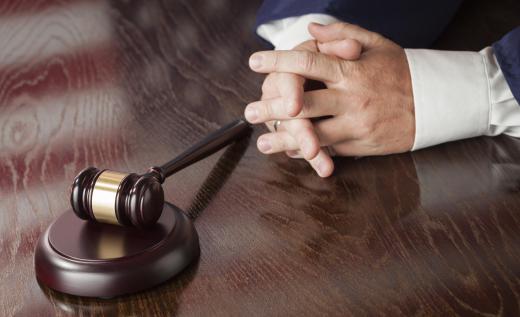Lack of evidence can essentially put an end to a person's legal case. Evidence refers to information that the plaintiff, prosecutor or defendant presents to the court to get the court to rule in his favor. Evidence can take many forms, such as witness testimony, DNA or forensic evidence, or anything else that helps the judge or jury determine that one or the other party has proven the elements of his case. If one party does not have evidence to back up the things he is saying to the court, then the court or jury must not side in his favor.
Lack of evidence can happen for a number of reasons. Sometimes, a party may have evidence but it may be inadmissible due to various rules of evidence. For example, if the police illegally searched someone's home without a warrant, any evidence discovered in the search of the home would be barred from being presented to or considered by the judge or jury in the case. In addition, under the rule called "fruit of the poison tree," any evidence that law enforcement officials collected as a result of information obtained from an illegal confession or search would also be inadmissible. This can result in a lack of evidence.

A party to a case may also experience a lack of evidence if he simply cannot find the proof of the case he is trying to make. For example, a prosecutor may be unable to find sufficient witnesses or hard evidence to link a defendant to a crime. A plaintiff may be unable to find the document that proves the defendant committed fraud.
The person who does not have evidence cannot win his case. Each party to a case has a specific burden. For example, in a criminal case, the prosecutor has the burden of proving beyond a reasonable doubt that the defendant committed the crime. The defendant, on the other hand, has the burden of either proving an affirmative defense or introducing a reasonable doubt. These burdens must be met for a party to prevail or win his case; and the manner in which these things are proven all require some type of evidence.

If a lack of evidence exists, a motion to dismiss may be appropriate. This occurs when the opposing party points out the lack of evidence and asks the court to please end the case since the other side can't possibly prove what it is trying to prove. A motion for a summary judgment may also be appropriate when there is no evidence to prove one or more elements of a case; such a motion is a request to the court that it end a trial early since there is no possible way the other side can win since it hasn't proven that the law entitles it to anything.
Frequently Asked Questions
How can insufficient evidence affect a trial?

As demonstrated by the initial response, insufficient proof can have catastrophic repercussions. In criminal trials, the prosecution must prove guilt beyond a reasonable doubt. This may result in the dismissal of the defendant from the case. If the plaintiff cannot prove their case owing to a lack of evidence, they may not be awarded the desired monetary damages.
What happens in a criminal trial if there is no evidence?

If the prosecution cannot establish the defendant's guilt beyond a reasonable doubt with the evidence at hand, the defendant is ruled not guilty. Possible result: the defendant is proven innocent. It cannot be stressed enough that the absence of evidence does not imply innocence; there may be further elements to consider.
Is it feasible to throw out a lawsuit for lack of evidence?
A case may be dismissed if there is insufficient evidence to support it. If the prosecution is unable to prove its case with adequate evidence, the court may decide to dismiss the case. But, new evidence may lead to more charges.
What does a civil case without proof mean?

Without proper proof, a civil case plaintiff may struggle to succeed. If the plaintiff cannot prove his claim, the court may deny compensation. The plaintiff needs a lot of evidence to win. Witnesses, recordings, and tangible evidence can be used as proof.
How can we avoid difficulties caused by insufficient evidence?
If proof is lacking, the prosecution or case can continue. They can also settle or plea bargain with the other side. To establish the best course of action when there is no evidence, consult an experienced attorney.
